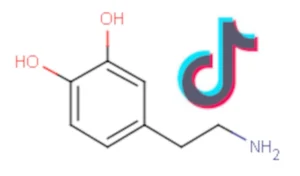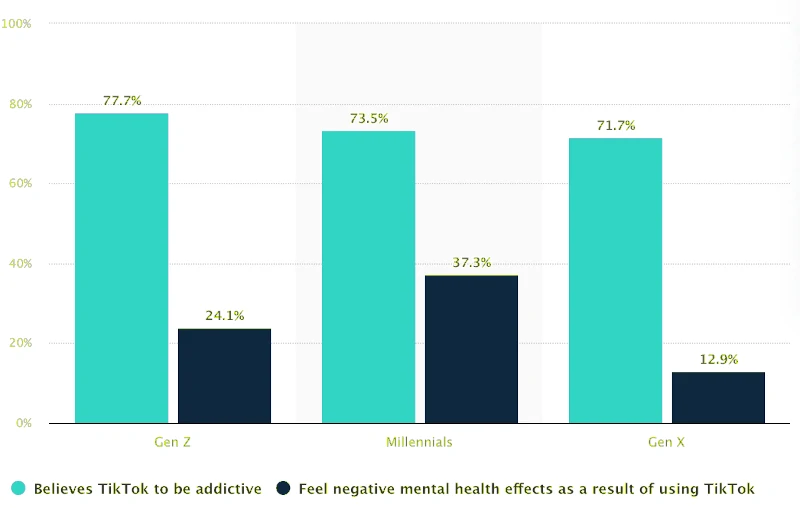In the world of social media, TikTok has established itself as a dominant force, attracting millions of users worldwide. Now “TikTok Addiction” is a very common keyword. But why is this platform so incredibly popular and why does it seem to be so difficult to leave? In this article, we will explore the fascinating aspects of TikTok, examining its potential to become addictive and the key role of dopamine in this process.

The Brief Madness of Entertainment
One of the distinguishing features of TikTok is its offering of short video content, only 15 seconds long. (You can elaborate on the reasons for TikTok’s success). People love “micro-entertainment” and short-form video distractions, and this is one of the main reasons for the app’s popularity. The videos are fun, hip, and follow the latest trend. But that still doesn’t answer the question: is TikTok dangerously addictive?
Mental health experts increasingly recognize the impact of social media on people’s emotional well-being. Manfred Spitzer has written a wonderful book on this topic, Digital Dementia. In particular, problematic use of TikTok is often viewed as a behavioral addiction. Although social media research is still relatively new, it appears that the “TikTok Brain” phenomenon is supported by the data. But how dangerous is this addiction really? Is TikTok more addictive than drugs?
The Science Behind TikTok Addiction.
The answers come from researchers and analysts. According to a Business Insider report, TikTok is comparable to the addictiveness of heavy stimulants. Analysts at Bernstein Research say TikTok offers a “sensory rush” as the algorithm pushes the most viral content directly to the user, providing a continuous release of endorphins with each scroll. But what makes it so difficult to quit TikTok?
The answer lies in a combination of factors. TikTok is addictive because of its entertainment value. Users are attracted to videos posted by others and often try to recreate them or post original content. But the key factor contributing to TikTok’s addictiveness is its “For You” algorithm, created by artificial intelligence.
Unlike other social media apps, a user’s feed is not based on deliberate choices, but on what the algorithm deems interesting to the user. Needless to say, society goes to great lengths to facilitate addictions. The lack of opportunities to socialize and undertake joint projects in the real world often drives the use of surrogates. Feel free to take our free TikTok Addiction Test.
Dopamine: The Secret of TikTok Addiction
TikTok addiction also exists because of one of the most powerful components of human behavior: dopamine. The app is able to stimulate the release of dopamine in the brain, making users feel good. This dopamine-based reward system is activated when using TikTok, encouraging users to continue using the app because of the positive feelings associated with it.
But there is more. TikTok offers a high degree of social status and positive reinforcement. Receiving likes, comments and shares on shared content can stimulate the pleasure center in the brain and make users feel part of a social group.
In addition, TikTok leverages gamified design elements, such as rewards and competition, to keep users engaged. The algorithm rewards users who create popular videos with increased visibility, leading to a “vicious cycle” of addiction as users seek to create increasingly popular content.
A few Numbers to get a clear Idea
Apparently, TikTok has 1 billion monthly active users (MAUs). Out of 4.8 billion internet users worldwide, 20.83% use TikTok. And out of 4.48 billion active social media users, 22.32% use TikTok daily.
According to a survey conducted by Statisa between April and May 2023 among TikTok users in the U.S., 77.7% of Generation Z users believed that TikTok is addictive. 72% of Gen X respondents also agreed with Generation Z.
Millennials were the demographic group of TikTok users most affected by the negative mental health effects due to the platform. 37.3% of respondents reported experiencing them.

Conclusions
While TikTok offers a huge dose of entertainment and social connection, it is important to be aware of the potential risks associated with overuse. As with any form of entertainment, moderation is the key to maintaining a healthy balance between the real world and the virtual world.
[…] mind again and again when we talk about Internet and social media addictions, especially those like Tiktok. Let’s take a brief and simple look at what this is all […]
[…] yourself in the immersive world of TikTok? If so, we have a solution for you. Introducing our TikTok Addiction […]
[…] what makes TikTok so engaging? What makes it so addictive? Participation and authenticity play a key role. Comments to videos on TikTok have become a […]
[…] exactly these reasons, the phenomenon of Tiktok Addiction is beginning to be talked about, and this platform is beginning to worry many […]
[…] sharing platform, has quickly gained a large user base worldwide. Despite concerns about privacy, addiction, and security, TikTok has brought with it numerous positives, ranging from access to quick and […]